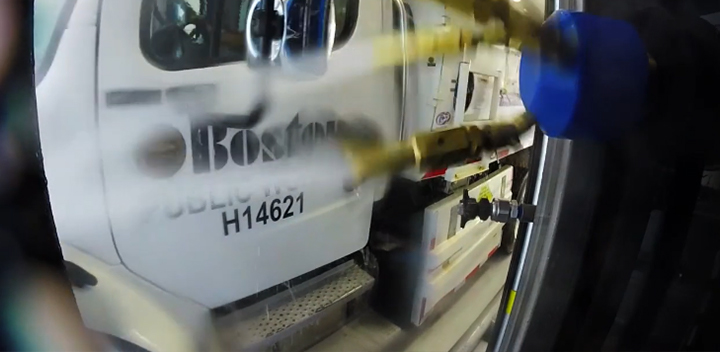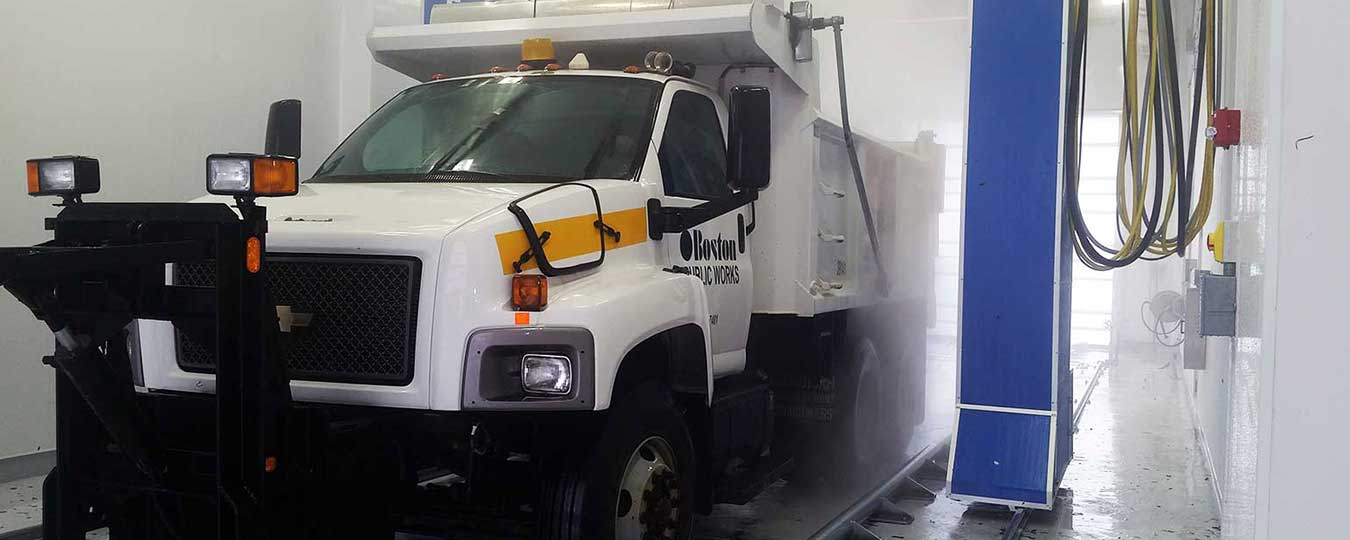High-Tech Large Vehicle Wash Keeps Boston’s DPW Fleet Clean and Operational
- April 16, 2018

Keeping New England’s largest fleet of public works vehicles clean and on the road is a relentless task, but it is vitally important to the longevity of
this massive fleet and to the safety of drivers in Boston.
Winters in New England can be challenging, particularly during blizzards and freezing road conditions. Understandably, it is paramount that Public
Works vehicles are well maintained and in good working condition in order to keep roads open for emergency vehicles and the public at large during
such conditions.
A key component to maintenance concerns includes cleaning. Not only are clean cars, trucks, plows and other heavy equipment assets better to show and operate, research has proven that over time, clean vehicles promote better mechanical maintenance, have dramatically increased chassis life, are
recognized as safer to operate and ultimately save money, time and hardship.
The Boston Department of Public Works Department (DPW) directs the general construction, maintenance, and cleaning of approximately 800 miles of roadways throughout the City and also provides snow and ice control for city streets and maintains more than 60,000 city-owned streetlights and 700+ intersections. As a result, it’s vital that public works vehicles remain on the road in good working condition and clean.
Prior to building the new facility at the Department of Public Works (DPW) campus at Frontage Road in downtown Boston, most of the city’s 2,000 vehicles were regularly cleaned as part of maintenance protocol. The department would rely on nearby privately-run car washes for cars or hand-cleaned by city employees at great expense. For more than a decade previous, the existing large vehicle wash station had been unusable. The wash station equipment became outdated and fell into disrepair as replacement parts became unavailable.
Before becoming unusable, Boston’s DPW had relied on a wash system that used a combination of force and friction to clean its vehicles. A selection of vehicles of various sizes were washed with spinning brushes. Not only was the old wash system slow and inefficient, it would only accommodate a portion of the fleet. Access to the old wash was very limited and the drivers and operators of Boston’s Department of Public Works vehicles struggled to keep city vehicles clean.
When it came time to design and build a new wash facility for the City of Boston's Department of Public Works, key stakeholders and decision makers moved strategically to ensure that the design and functionality of the proposed large vehicle wash was up to the challenge of keeping Boston’s entire fleet of vehicles and heavy equipment clean, safe and operational.
MTI’s reputation for delivering solid solutions
In an effort to promote the very best workable solutions, Boston retained Weston and Sampson, an engineering firm that is highly specialized in Public
Works designs and an affinity for the highly specialized discipline of large vehicle wash design. The resulting relationship, thought-filled research
and engineering, promoted a very comprehensive bid package.
With good fortune a well-respected General Contractor, Northern Contracting, was awarded the project who, in turn, introduced the highly specialized
skill set of Maintenance Tech., Inc. to the project. This completed the assembly of talent including the General Contractor, Engineering Group, and
City professionals that would ultimately construct the extraordinary multi-use vehicle wash facility.
“MTI is an excellent company to work with.
They are very responsive to our DPW requests and
are driven to deliver customer orientated results.”
-Weston
and Sampson
“We work with MTI because they do what they say
they will do and they deliver on time!”
-Northern Contracting
___________________________
The project team spent the necessary time and resources with key project personnel and the future wash operating staff to make certain that expectations were understood and that proposed plans were intact and deliverable.
“The most productive way to begin the new wash system design process was to start a dialogue with the people who would be responsible for operating it, along with those who will actually be driving their vehicles through it,” said MTI President, Michael Show. “We believed that the better we can understand how, where and when these vehicles will be washed, the easier it will be to direct how the design intent will be implemented.”
Following these discussions, the MTI team approached several equipment manufacturers to begin assembling a custom wash solution that would satisfy the city’s specifications and, equally important, their expectations. During these discussions, several important considerations were realized and addressed successfully. The MTI team, City Professionals and Engineering addressed the increased use of stronger, more adhesive road salt solutions, operations during sub-freezing temperatures, specialized heavy equipment washing and how to best appease growing concerns over wastewater treatment and the inadvertent contamination of roadways adjacent to the new facility,
MTI worked quickly to provide design assistance, pre-construction assessments and inspired alliances between Northern Contracting and the related trades
specific to the relevant divisions of work related and associated with the construction of the wash bay.
A consistent and regular dialogue complimented by hard work and dedication from MTI, the General Contractor for the project, and related trades provided
the City of Boston with the necessary accountability, schedule-conscious progress and timely delivery of a fully functional truck wash facility for
the city that exceeded initial expectations.
The design team at MTI implementing over 26 years of industry specific experience worked to implement a wash system that would accommodate vehicles as large as a wheeler style plow, front-end loaders, trash trucks, street sweepers and as small as the sub-compact hybrid sedans used by city employees.
Straight talk leads to better results
Boston’s new ‘touch free’ wash system senses and adjusts to the contours of each vehicle as it enters the wash. A combination of both active-scanning sensors and ultrasonic waves creates a digital map for each vehicle and communicates to the wash system the exact length, width and height of the vehicle, dispensing the corresponding amount of soap and water to be applied to the vehicle at the most appropriate pressure and distance.
In order to optimize the performance of the wash technology, MTI recommended the construction of a contouring top arm assembly that enables the wash
apparatus to travel over each vehicle with precision, contouring to the vehicle’s top, front and back. This allows the drivers to remain inside the
vehicle during the wash process – something that was not possible with the previous wash system.
At more than 90 feet long, the new large vehicle wash facility can accommodate up to four full sized pickup trucks at one time. Intelligent controls
allow the wash arm to identify each vehicle as a separate piece of equipment and process each cycle independently.
“The Maine team does everything that we ask of them and more.
They work hard to exceed our expectations”
-Boston, DPW
____________________
In addition, a water recovery system was installed that enables water to be recycled for reuse, which saves the City of Boston a considerable amount of
discharge liability and potential impact fee assessments or fines, while also addressing environmental concerns.
The MWRA approved design was implemented with ease and continues to offer the City the treatment processes required to maintain the strict discharge
ordnances required by the MWRA.
Not only are Boston’s DPW vehicles and drivers benefiting from the capabilities of the new large vehicle wash, other departments within the municipality are now using the wash too. As a result, the DPW is not only spending less to keep its fleet clean, it now includes a new source of revenue which will undoubtedly lead to better maintenance and care for the entire DPW fleet while providing an added service to other City departments.
“It can sometimes be a costly and painful experience for Ownership, General Contractors, Construction Managers and Design Teams to build functioning vehicle
wash facilities that satisfy expectations and design intent. The facilities are not just buildings, they are a harmonization of sophisticated interrelated
systems of which the building structure is only one component.
When we are fortunate enough to be involved, it is highly rewarding for our team to help address wash related concerns, engineer satisfactory solutions,
implement designs, create implementation strategies and construct a wash facility that exceeds expectations and repeatedly delivers satisfactory performance
to all involved. Our clients appreciate our win-win approach and dedication to providing effective solutions. When a client hires us, it is usually
the beginning of a long-lasting relationship between our teams,” said MTI President, Michael Snow.
Thank you to the City of Boston DPW
We congratulate the City of Boston for having the foresight to bring the right players to the table at the very beginning – and to remain active throughout the process, allowing Maintenance Tech., Inc and the entire team to integrate an effective wash system and process. The Maine team from MTI wishes to thank the City of Boston for this opportunity and for allowing our company to add another great reference and success story to our portfolio of work.


